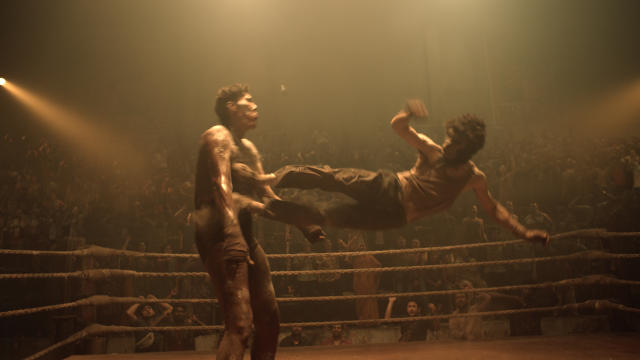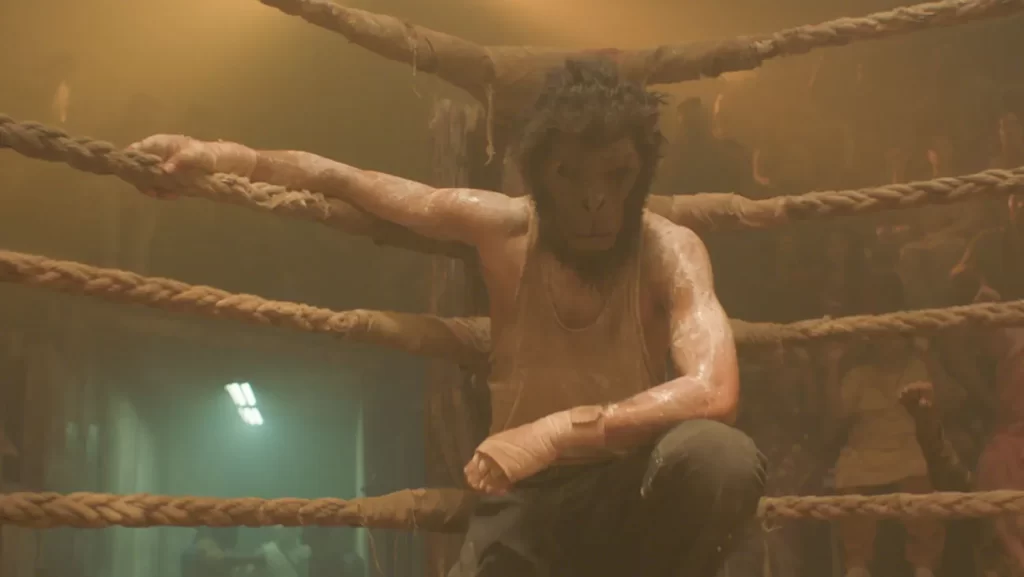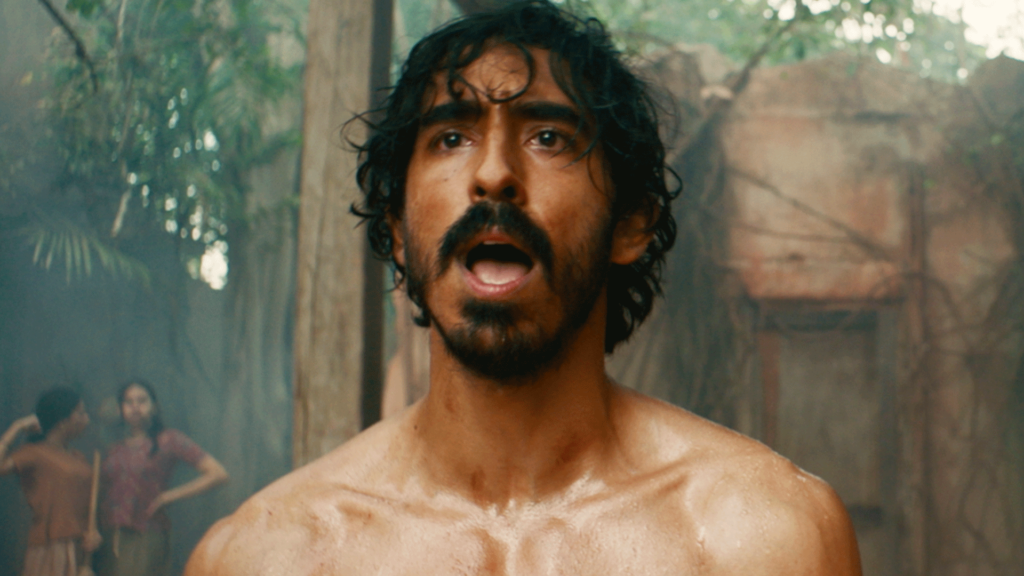By Alex McPherson
Bone-crunchingly violent and layered with social commentary, director Dev Patel’s “Monkey Man” is an action thriller that packs a real punch, in more ways than one.
Our unnamed protagonist (Patel), called the Kid in the credits, lives in the perpetually dark slums of Yatana (a fictional city modeled off Mumbai), where skyscrapers overshadow the have-nots below, and religion is used by those in authority as a tool to retain power above all else.
The Kid makes ends meet working as a fighter in an underground club run by the sadistic Tiger (a typically unhinged, scenery-chewing Sharlto Copley). Performing under the guise of a character named Monkey Man, the Kid gets paid when he loses matches and only receives his full fee if Tiger sees him bleed in the ring.
It’s a bleak existence; a reflection of the Kid’s tortured soul molded with trauma, quietly biding his time to get enough money for a gun and find the moment to strike back. Kid’s fury stems from a tragic childhood, wherein the corrupt police chief Rana (Sikandar Ker, perfectly detestable) murdered his mother, Neela (Adithi Kalkunte), while Rana and his cronies, under guidance from a blatantly evil spiritual guru Baba Shakti (Makarande Deshpande), burned his forest-dwelling community to the ground to take their land. Kid’s hands are scorched and rugged: a reflection of his past and the vengeance he’s compelled to deliver against Rana one day.
When the Kid was little, Neela told him the story of the Hindu deity Hanuman, who consumed the sun (thinking it was a fruit), was stripped of his powers, and gradually reacquired them to lead an army against forces of evil. This story left a deep mark on the Kid, and helps further his desire for righteous payback.

The Kid finds a high-end nightclub/brothel called Kings, run by Queenie (Ashwini Kalsekar), that’s frequented by Rana and his cronies. The Kid swiftly gets hired as a kitchen worker via returning Queenie’s “stolen” wallet and returning it to her (depicted like a Rube Goldbergian system of handoffs among crowded city streets and rooftops). He befriends Alphonso (Pitobash), a gangster working for Queenie who owns a super-charged tuk-tuk and provides most of the film’s comic relief.
After helping Alphonso win a large bet on one of Kid’s matches in exchange for a promotion, the Kid is granted access to the VIP room, where Rana often makes an appearance. The Kid also meets the beautiful Sita (Sobhita Dhulipala), a prostitute working for Queenie who shares the Kid’s deep-seated anger against authority figures.
The stage is set for maximum carnage, complete with a trusty canine who helps transport the Kid’s pistol of choice in a back alley handoff. Suffice to say, however, that the Kid’s machinations don’t go exactly to plan. Hyper violence ensues, the Kid is on the run, and unlikely allegiances form.
He fights resourcefully, and cartoonishly brutally, for the marginalized and to achieve some sort of justice for the wrongs committed against him and his community, starting from the bottom and willing to fight all the way to the top: taking no prisoners along the way as he gradually embodies the Hanuman of legend.
Indeed, “Monkey Man” is an unrelenting thrill ride from start to finish, directed with sustained energy by Patel. It’s an abrasive, kinetic experience with rough edges that only add to its provocative charm. With balls-to-the-wall (and knives-in-mouths-to-throats) action sequences, cultural representation, and a tragic emotional core (unflinchingly detailing the horrors of India’s caste system and the cycles it perpetuates), “Monkey Man” effectively carves its own niche in the action genre while paying tribute to its cinematic inspirations, more “The Raid” and “Oldboy” than a mere “John Wick” knockoff.

And boy oh boy, do those action scenes hit hard. “Monkey Man” is chock-full of gonzo, wince-inducing violence (which sometimes doubles as slapstick comedy) that lands with tangible force. Patel and cinematographer Sharone Meir find an excellent balance between clarity and chaos, throwing viewers into the action with dynamic camerawork that runs, flips, and swerves with each strike, putting us right in the thick of it, fighting to keep up with the carnage on display.
Anything and everything at-hand is used at combatants’ disposal (microwaves, firecrackers, good ole’ chompers), and Patel most assuredly does not cut away from gnarly impacts. The flow of these sequences syncs with the Kid’s own arc, expertly reflecting his growth from an impulsive man seeking justice to someone fighting for a purpose beyond himself.
Patel, lean and ripped, with expressive eyes that convey a man driven by self-destructive determination, brings pathos and frightening, live-wire energy to the role. We see a man wracked with trauma, guilt, and possessing a fierce desire for revenge, communicating multitudes through his haunted eyes alone as someone willing to go to any length to find some semblance of peace through violence.
Patel’s performance would, by itself, sell the Kid’s rage and thirst for vengeance, but part of the thrill of “Monkey Man” is how the film brings viewers into his world and mind. Meir’s frenetic, grimy cinematography (complemented by a badass soundtrack and dramatic, percussive score by Jed Kurzel) flies through Yatana’s seedy underbelly and grows more controlled over time, evolving as the Kid evolves, hypnotic in its eventual singularity of form and vision.
Scattered flashbacks mix in tranquil memories of Neela’s teachings with the shocking massacre of their village, forcefully emphasizing the thoughts that dominate the Kid’s every waking moment and sometimes becoming downright horrific. This establishes the grim momentum of a wronged man charting a path towards revenge and, likely, his own death.

But later on, when the Kid is saved from near-death and subsequently trained by the hijra (a tribe of third-gender people marginalized by Baba’s government) to confront his trauma and follow in Hanuman’s footsteps, “Monkey Man” becomes almost euphoric. The jagged, at-times clunky film that came before morphs into something more confident, assured, and focused on what it wants to be.
We’re witness to a rousing training montage that’s electric in its musicality and depth of feeling – the claustrophobic intensity of what came before releasing in a kind of focused catharsis for the Kid, and by extension, us as viewers, as the film leans into hallucinogenic imagery and brings in actual news footage of modern day India.
The resulting film, while familiar in its revenge-genre-beats, is almost uncomfortably effective at putting us in the Kid’s psyche: religion and rage guiding him towards bloody salvation underneath the story’s deceptively simple “Eat the Rich” appearance.
It’s to the film’s credit that we’re with the Kid nearly every step of the way, stepping back once the end credits roll to examine what’s been gained and lost along his anarchic path – self-actualization or loss of personhood, and if his actions even mean anything for the future of Yatana. Patel, provocatively, leaves us to come to our own conclusions.
Whether or not the film’s commentary on the state of India today is particularly insightful, too, is up for debate (and something I’m not qualified to evaluate with my limited cultural knowledge), but as a crowd-pleasing action film that finds new avenues into a familiar genre, “Monkey Man” delivers the goods, albeit not for the squeamish. It’s an experience that deserves recognition (and the big screen treatment, thank you Jordan Peele), and signals Patel as a director capable of something truly legendary in the future.
“Monkey Man” is a 2024 action thriller directed by Dev Patel and starring Patel, Sharlto Copley, Adithi Kalkunte, Ashwini Kalsekar, Makarande Deshpande, Sikandar Ker and Sobhita Dhulipala. It is rated R for strong bloody violence throughout, language throughout, sexual content/nudity and drug use, and the runtime is 2 hours, 1 minute. It opened in theatres April 5. Alex’s Grade: A-.

Alex McPherson is an unabashed pop culture nerd and a member of the St. Louis Film Critics Association.

